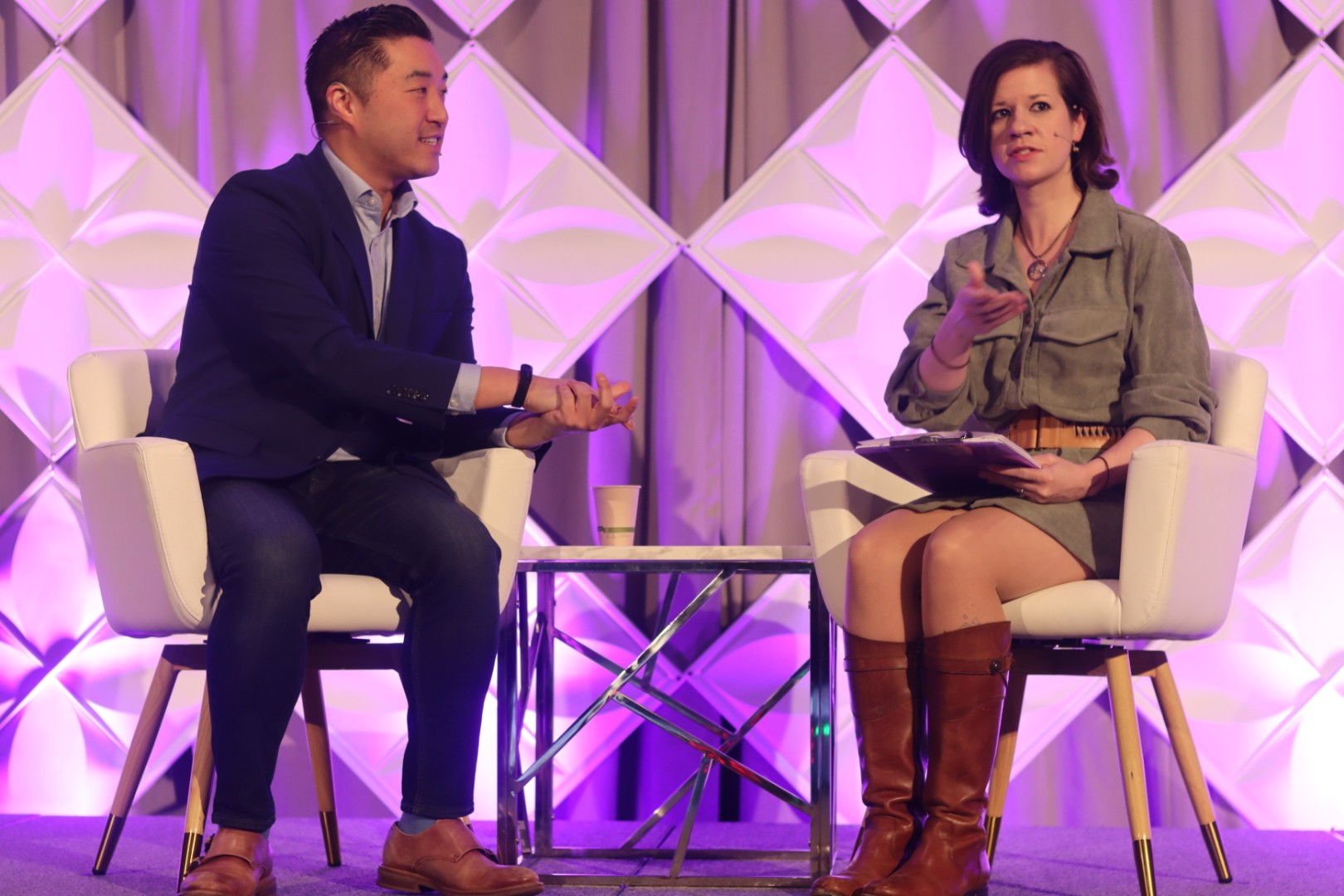Verizon’s Andy Choi on transitioning from journalism to internal comms
Choi shared how journalism skills can inform your executive communications at Ragan’s Employee Communications Conference.

Amid a transforming and shrinking media ecosystem, it’s no secret that many former journalists become successful communications leaders. Journos who rely on PR pros often foster a symbiotic understanding of each other’s strengths, while the professions share many of the same core skills— with listening to your audience at the center.
Opening the final day of Ragan’s Employee Communications and Culture Conference in Chicago, Ragan Content Director Jess Zafarris went deep with Verizon Head of Communications Andy Choi about how his 15 years as a broadcast news anchor for ABC, CBS, and NBC affiliates around the country informed his transition to internal comms.
Here’s what stuck out.
Consistent curiosity despite a shift in focus
Choi emphasized that being curious about what’s going on in your world, your communities and what they care about is a shared trait of journos and internal communicators alike.
“Do I know what those employees I serve care about, the same way in a newsroom I’m on the pulse of what our readers care about?” he asked. “You think about internal comms as a journalist and all of a sudden, all these wonderful things start to happen.”
Of course, communicating with internal audiences requires a shift in focus. Being on-air is ultimately a personal thing—a journalist represents the station they work for and has an opportunity to inject their personality into the brand. Communicating to internal stakeholders changes things, requiring you to focus more on being a reputation guardian of the brand instead.
“It’s a little less about you,” Choi explained. “You feel a tremendous honor, but also a responsibility to think about what the brand represents and what you can do to represent the team.”
Maintaining your personal brand within the internal culture is a matter of trust
Transitioning to an internal role needn’t mean that a former journalist must completely abandon their personal brand, though. To the contrary, finding that balance between where your personal brand intersects with the company brand is a strategy that you can embed across the organization.
“People are always talking about bringing your whole self- you’ve got to remind yourself that’s where you’ll be most comfortable,” said Choi. “You don’t want to walk in and say, ‘I’m doing this because I’m obligated to portray the brand a certain way.’ There’s an opportunity there to be memorable.”
Infusing your personal brand into internal comms also radiates outward to executives and helps infuse trust in the brand’s leadership.
“Trust is the number one thing that you’re mining for every single day as you’re putting stories together,” Choi continued. “Do they trust you as someone who can be the bridge between the executives and customers? That is very much aligned with the way that journalists and former journalists operate.”
He went on to explain why this is especially crucial in an age when trust is fragile.
“People would look at the Walter Cronkite’s of the world and say, ‘I trust this man.’ Now, trust is threatened due to an onslaught of information. People are looking to brands, corporations and places they work to say, ‘I trust the company I work for.’”
Ultimately, this is an opportunity for internal communicators with past journalism skills to make an impact and ensure the way that executives communicate fosters trust with employees and customers alike.
Making exec comms personal
The core skills of a reporter can be applied to better understanding an executive’s personal brand, learning what they care about and working the community to get to know people on a real level.
For Choi, this means looking at the pictures on their office walls, their memorabilia and the things they’re passionate about to find out where those details can surface organically in messaging. This helps the comms role gain influence, too, as it’s often hard for executives to place their passions and identify where their personal preferences can shine.
“You need to pick up on some of the things that are unsaid, unspoken, unwritten,” said Choi. “What do they care about, and how can I bring that out?”
Where trust and authenticity meet
Ultimately, applying the principles of observing and reporting to your executive comms strategy is still an exercise in authenticity. This is more crucial than ever in a time when disinformation runs rampant—an issue that can corrode trust in both media brands and other corporations.
“We’ve got to believe what we say, what we write,” Choi said. “And if that’s not the case, let’s have a conversation about it.”
He encouraged communicators to ask themselves if they’re going about this the right way, asking the right questions, and telling the right story the same way that journalists do.
“Ensure that those conversations are sacred,” said Choi.“We should be welcoming that dialogue.”








Andy’s comments are spot on.
Using a journalism background to influence our internal communications efforts makes a difference.